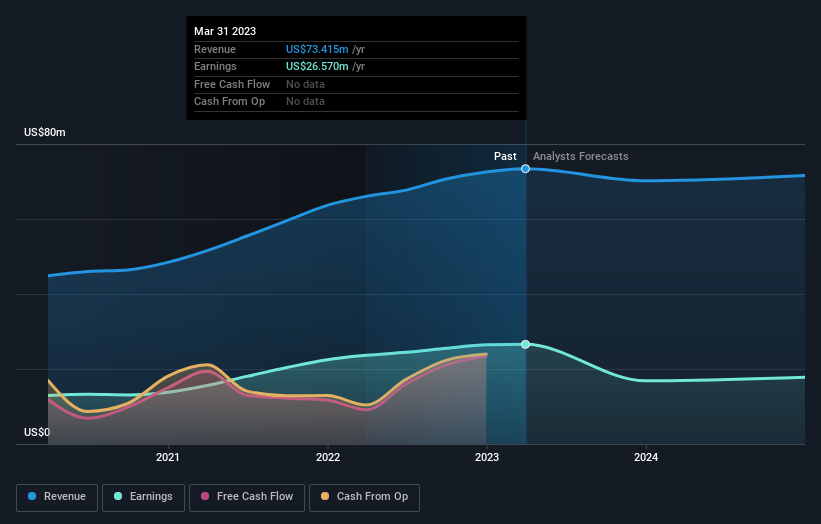Princeton Bancorp, Inc. (NASDAQ:BPRN) is definitely on the radar of institutional investors who own 40% of the company
Key Insights
Given the large stake in the stock by institutions, Princeton Bancorp's stock price might be vulnerable to their trading decisions
A total of 14 investors have a majority stake in the company with 51% ownership
To get a sense of who is truly in control of Princeton Bancorp, Inc. (NASDAQ:BPRN), it is important to understand the ownership structure of the business. And the group that holds the biggest piece of the pie are institutions with 40% ownership. That is, the group stands to benefit the most if the stock rises (or lose the most if there is a downturn).
Because institutional owners have a huge pool of resources and liquidity, their investing decisions tend to carry a great deal of weight, especially with individual investors. Hence, having a considerable amount of institutional money invested in a company is often regarded as a desirable trait.
In the chart below, we zoom in on the different ownership groups of Princeton Bancorp.
View our latest analysis for Princeton Bancorp
What Does The Institutional Ownership Tell Us About Princeton Bancorp?
Institutions typically measure themselves against a benchmark when reporting to their own investors, so they often become more enthusiastic about a stock once it's included in a major index. We would expect most companies to have some institutions on the register, especially if they are growing.
Princeton Bancorp already has institutions on the share registry. Indeed, they own a respectable stake in the company. This implies the analysts working for those institutions have looked at the stock and they like it. But just like anyone else, they could be wrong. When multiple institutions own a stock, there's always a risk that they are in a 'crowded trade'. When such a trade goes wrong, multiple parties may compete to sell stock fast. This risk is higher in a company without a history of growth. You can see Princeton Bancorp's historic earnings and revenue below, but keep in mind there's always more to the story.
Princeton Bancorp is not owned by hedge funds. Martin Tuchman is currently the company's largest shareholder with 10% of shares outstanding. With 7.5% and 5.9% of the shares outstanding respectively, AllianceBernstein L.P. and Andrew Chon are the second and third largest shareholders. Additionally, the company's CEO Edward Dietzler directly holds 0.6% of the total shares outstanding.
After doing some more digging, we found that the top 14 have the combined ownership of 51% in the company, suggesting that no single shareholder has significant control over the company.
While studying institutional ownership for a company can add value to your research, it is also a good practice to research analyst recommendations to get a deeper understand of a stock's expected performance. There is a little analyst coverage of the stock, but not much. So there is room for it to gain more coverage.
Insider Ownership Of Princeton Bancorp
While the precise definition of an insider can be subjective, almost everyone considers board members to be insiders. Company management run the business, but the CEO will answer to the board, even if he or she is a member of it.
I generally consider insider ownership to be a good thing. However, on some occasions it makes it more difficult for other shareholders to hold the board accountable for decisions.
It seems insiders own a significant proportion of Princeton Bancorp, Inc.. Insiders own US$38m worth of shares in the US$155m company. It is great to see insiders so invested in the business. It might be worth checking if those insiders have been buying recently.
General Public Ownership
With a 35% ownership, the general public, mostly comprising of individual investors, have some degree of sway over Princeton Bancorp. While this size of ownership may not be enough to sway a policy decision in their favour, they can still make a collective impact on company policies.
Next Steps:
I find it very interesting to look at who exactly owns a company. But to truly gain insight, we need to consider other information, too. Like risks, for instance. Every company has them, and we've spotted 2 warning signs for Princeton Bancorp (of which 1 can't be ignored!) you should know about.
If you are like me, you may want to think about whether this company will grow or shrink. Luckily, you can check this free report showing analyst forecasts for its future.
NB: Figures in this article are calculated using data from the last twelve months, which refer to the 12-month period ending on the last date of the month the financial statement is dated. This may not be consistent with full year annual report figures.
Have feedback on this article? Concerned about the content? Get in touch with us directly. Alternatively, email editorial-team (at) simplywallst.com.
This article by Simply Wall St is general in nature. We provide commentary based on historical data and analyst forecasts only using an unbiased methodology and our articles are not intended to be financial advice. It does not constitute a recommendation to buy or sell any stock, and does not take account of your objectives, or your financial situation. We aim to bring you long-term focused analysis driven by fundamental data. Note that our analysis may not factor in the latest price-sensitive company announcements or qualitative material. Simply Wall St has no position in any stocks mentioned.
Join A Paid User Research Session
You’ll receive a US$30 Amazon Gift card for 1 hour of your time while helping us build better investing tools for the individual investors like yourself. Sign up here

 Yahoo Finance
Yahoo Finance 

